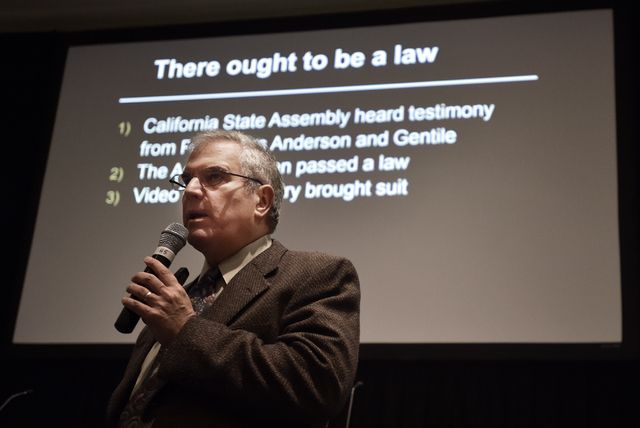Click here to subscribe today or Login.
PLAINS TWP. — After offering grim statistics showing boys are falling behind girls in school — lower scores on national tests, fewer taking Advanced Placement courses, fewer college degrees — Dr. Leonard Sax offered some reasons: Video games, poor role models, too many sport events where everybody gets a trophy and snowball fight bans on school grounds.
“The unintended consequence is that boys conclude school is not for boys,” Sax said during his keynote speech at GradNation, a “community summit” focusing on ways to improve area graduation rates held at the Mohegan Sun Pocono conference center Friday.
To drive home the snowball point, Sax recounted his childhood when teachers would join a snowball fight, then projected the official policy of an Ontario school district forbidding the throwing or kicking of snow. “Snow is to stay on the ground at all times,” it insisted.
“Why did this happen? Well, because of liability. I understand that,” the family physician said. “But there’s a better alternative than just prohibiting the throwing of snowballs.” He cited a school that allows snowball fights on the football field, with participants wearing safety goggles.”You create a space where it is in bounds for throwing snowballs.”
Some schools even hold snowball tournaments that actually show the snowball ban impacts boys far more than girls. “About 80 percent of the kids who show up are boys.”
Sax also cited role models of the past in music, like the Beach Boys singing “Be True to Your School” and Sam Cook’s hit “Wonderful World” lyrics “I don’t claim to be an A student, but I’m trying to be.”
“That is simply not the culture they grow up in now,” he said, flashing pictures of Justin Bieber and rapper Akon, a name the singer took “because he claims to be a con, a convicted felon. He claims to have been convicted of grand theft auto and served two years.” The truth, Sax said, is that “he’s never been convicted of anything.
“That’s a pretty significant change. We’ve gone from a culture where young men wanted you to think they were scholars working hard to get an A instead of B,” Sax said, “to a culture where they want you to think they are convicted felons and gang members even if they are not.”
Similarly, he noted, the male propensity to write fiction about violence has been curbed in schools. He cited a story he wrote as a child about a man trying to escape from East Germany who stepped on a mine, was shot at, and died just as the West German soldiers were pulling him to safety. The story won an award from a national organization, Sax said.
“Boys write traumatic stories of a violent death,” he said. They always have. The difference is that “now it gets you in trouble.”
But Sax focused most of his talk on video games, noting research has shown boys and girls spend about the same amount of time playing, but girls prefer titles like Candy Crush while boys go for the violence of Call Of Duty or Grand Theft Auto.
Research also shows six hours or fewer a week is fine, while anything more begins to change a child by “displacement,” taking too much time away from things like studying and sleeping. And the more hours per week a person plays, the more serious the impact.
Games with “moral inversion,” where the avatar gets ahead by doing things considered bad in real life, have the worst impact, he added. One three-year study showed no change in a boy who played games rated E for everybody, such as football simulations, but gradually changed a boy playing M, for mature, games.
The latter became more impatient, more selfish, less honest and more hostile, and didn’t recognize the change because he associated with other boys playing the same game who experience similar gradual changes, Sax said. In fact, being the first to attain a new level in a violent game can boost a boy’s social status among his game-playing peers.
When legislators in California determined some games have a bad effect, they passed a law barring the sale of those games to anyone under 18, though parents could still buy them for children of any age. The law was ultimately struck down by the U.S. Supreme Court after game companies sued, Sax said. The court ruled it violated First Amendment rights.
Along with watching what games children play, Sax offered some basic guidelines for parents: Limit play to 40 minutes a day on school nights and one hour a day on weekends, and don’t let minutes “roll over” so the child avoids playing during the week in order to binge on the weekend.
“The job description of parents has changed because technology has changed,” Sax said. “You get a lot of old people, people over 40, that don’t understand what I’m talking about here. They don’t understand that video games undermine boys’ motivation.
“They find that implausible, because when you talk about video games with people over 40, it turns out they think you are talking about Pong, or Pacman. They don’t understand that this is a different world.”
The summit, organized by United Way of Wyoming Valley with several partners, drew more than 200 people. Following Sax, a panel of five students gave personal stories of what motivated them in school. The crowd broke up into smaller focus groups after that.





